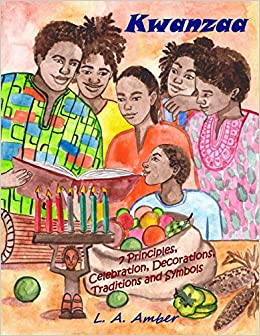- Children's Books
- >
- Kwanzaa: 7 Principles, Celebration, Decorations, Traditions and Symbols: A Kwanzaa Book for Kids by L. A. Amber
Kwanzaa: 7 Principles, Celebration, Decorations, Traditions and Symbols: A Kwanzaa Book for Kids by L. A. Amber
Instant Best Seller in Kwanzaa Book for Kids Award-winning author L. A. Amber Kwanzaa: 7 Principles, Celebration, Decorations, Traditions and Symbols will teach your kids all about the celebrations, practices and traditions.
This beautiful rhyming and fully illustrated book will inspire your family and especially your kids how to celebrate Kwanzaa.
Maulana Karenga created Kwanzaa. Kwanzaa is an annual celebration of African-American culture held from December 26 to January 1, culminating in gift-giving and a feast of faith called Karamu Ya Imani. It was first celebrated in 1966.
The name Kwanzaa derives from the Swahili phrase matunda ya kwanza, meaning "first fruits of the harvest". Kwanzaa celebrates the seven principles of Kwanzaa, or Nguzo Saba.
Umoja (Unity): Maintain unity in the family, community, nation, and race.
Kujichagulia (Self-Determination): Define and name ourselves, as well as to create and speak for ourselves.
Ujima (Collective Work and Responsibility): Build and maintain our community together.
Ujamaa (Cooperative economics): Build and maintain our own stores, shops, and other businesses.
Nia (Purpose): Make our collective vocation the building and developing of our community in order to restore our people to their traditional greatness.
Kuumba (Creativity): Do always as much as we can in order to leave our community more beautiful and beneficial than we inherited it.
Imani (Faith): Believe with all our hearts in our people, our parents, our teachers, our leaders, and the righteousness and victory of our struggle.
Kwanzaa celebratory symbols include a mat (Mkeka) on which other symbols are placed: a Kinara (candle holder for seven candlesticks), Mishumaa Saba (seven candles), mazao (crops), Mahindi (corn), a Kikombe cha Umoja (unity cup) for commemorating and giving shukrani (thanks) to African Ancestors, and Zawadi (gifts).




